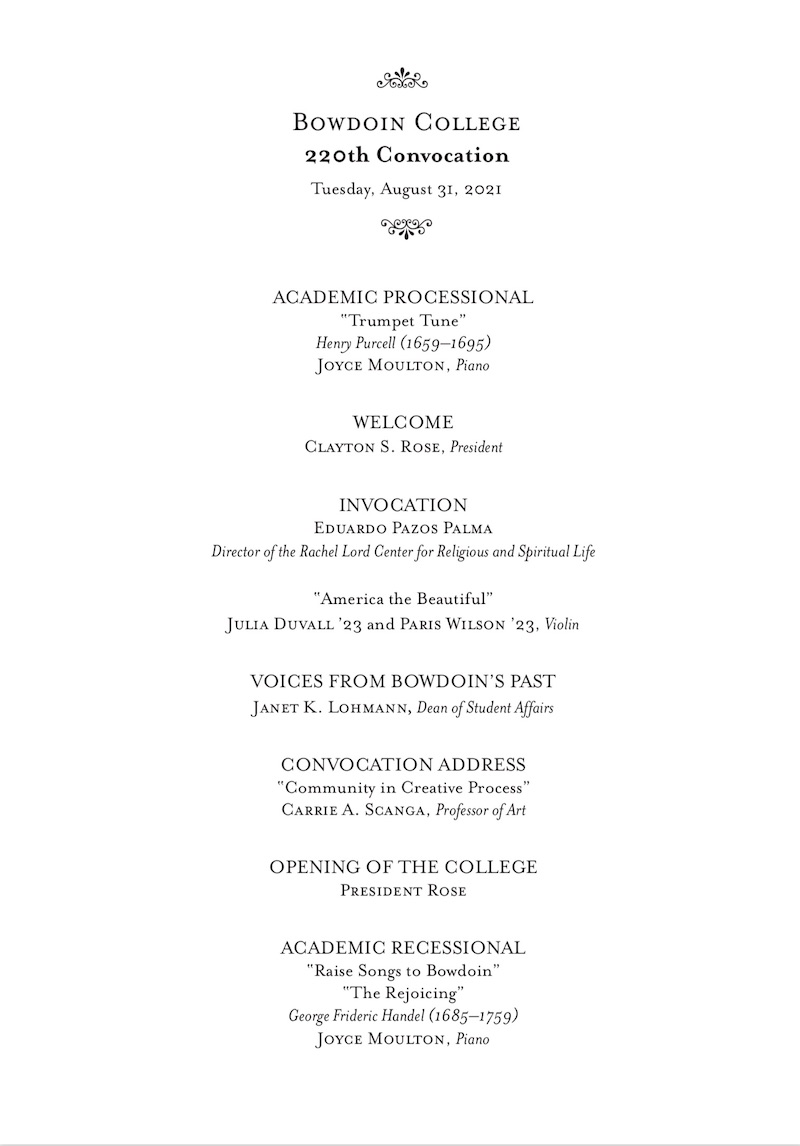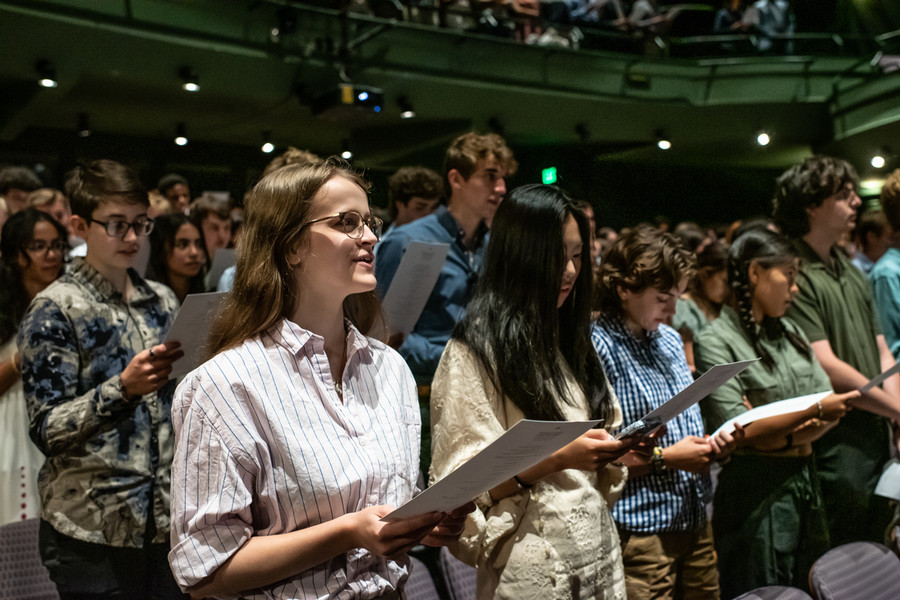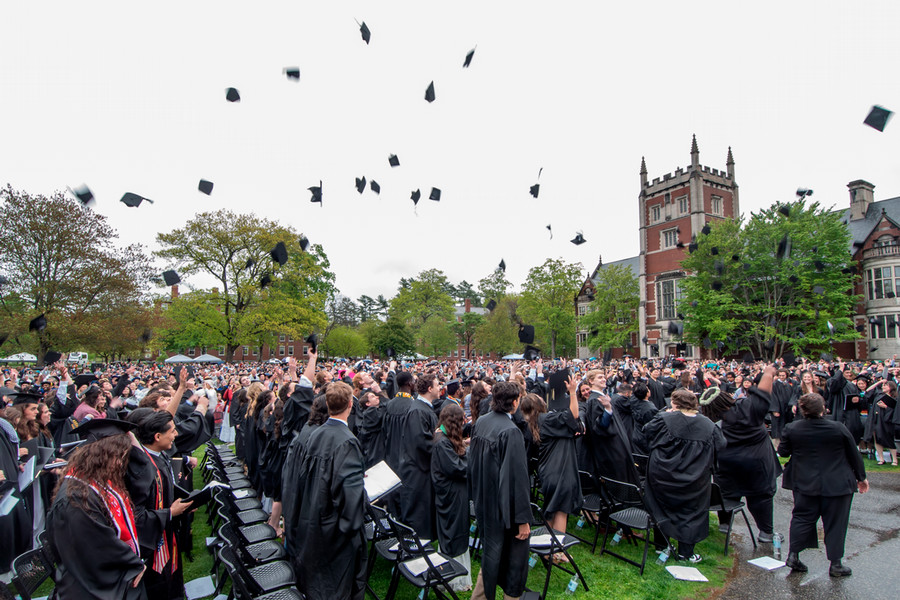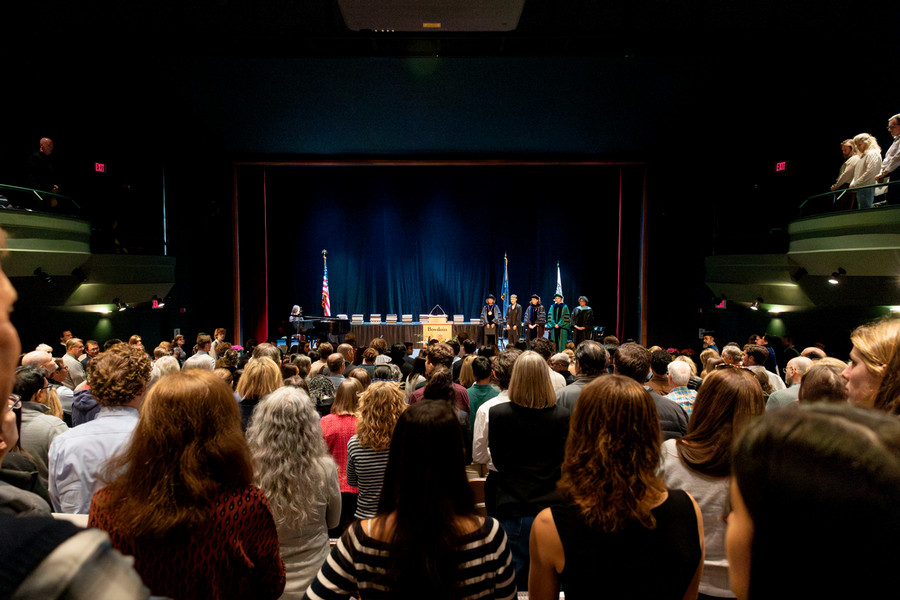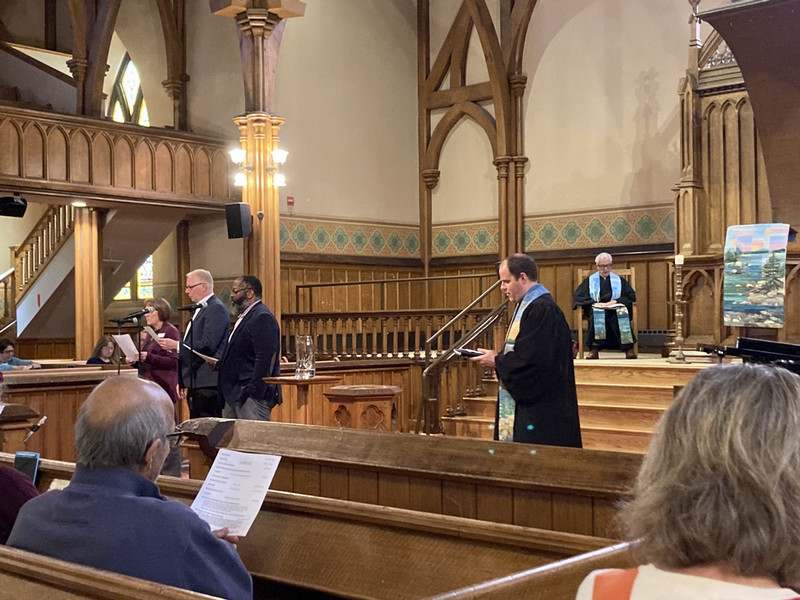220th Convocation: Bowdoin Officially Opens the Academic Year
By Rebecca Goldfine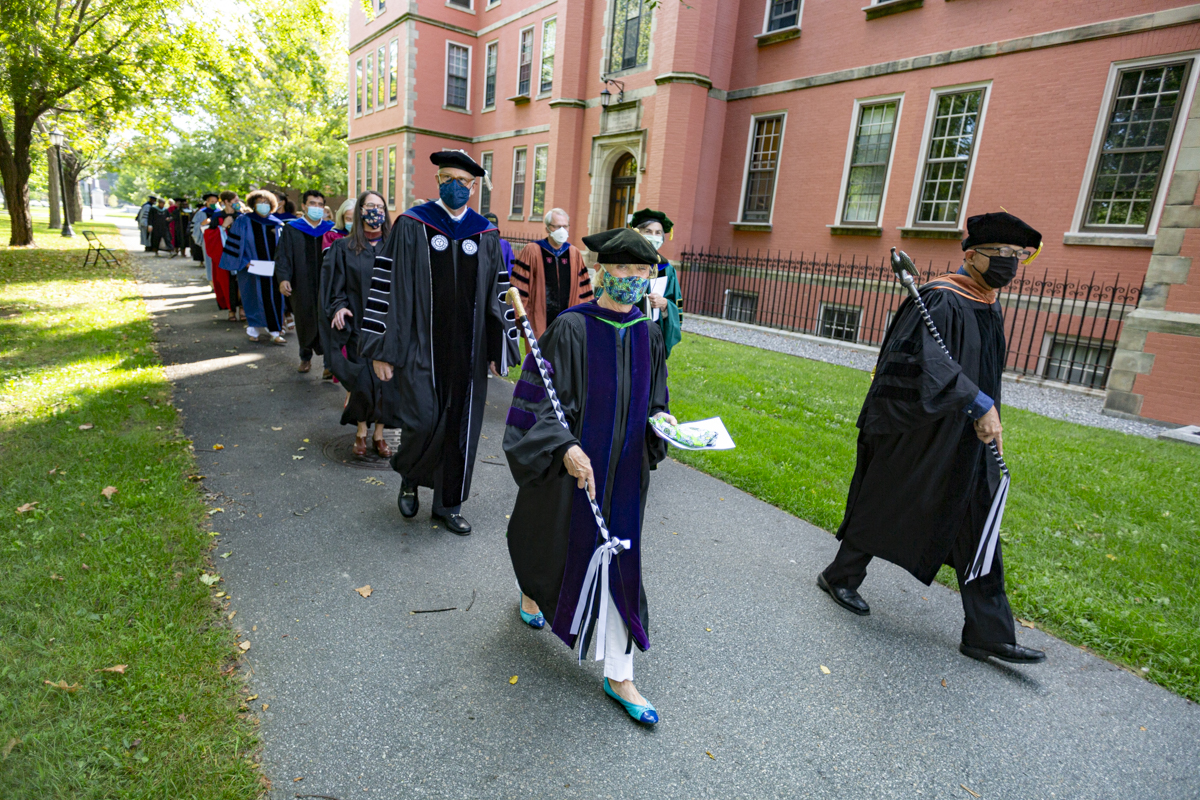
The 219th Convocation ceremony last year was livestreamed—one of the many aspects of the Bowdoin experience disrupted by the pandemic. This year, while people did gather inside, everyone wore face masks and took a COVID antigen test before the event.
Welcome
After standing up at the podium and removing his mask, President Clayton Rose announced, "We are back!"—prompting cheers and claps from the audience. After expressing his appreciation for the College community for remaining dedicated throughout the continuing challenges of the pandemic, Rose told the 522 first-year students of the Class of 2025, and the two transfer students, how pleased he was they had joined Bowdoin.
Following Rose's welcome, three others spoke at the event; Director of the Rachel Lord Center for Religious and Spiritual Life Eduardo Pazos Palma; Senior Vice President and Dean for Student Affairs Janet Lohmann; and Professor of Art Carrie Scanga.
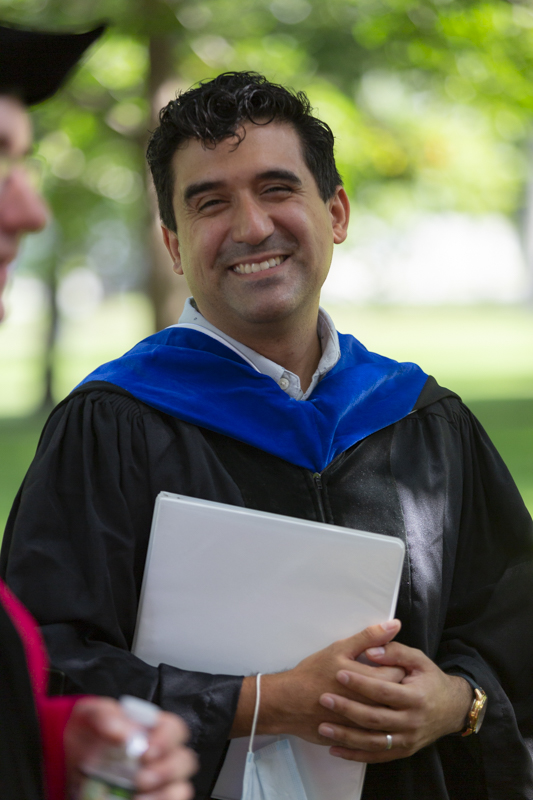
Invocation
Addressing the Class of 2025, Pazos wished the students "joy, gratitude, and hope" for the next four years. "May you enter this chapter of your life with hearts and minds open to a whole new set of possibilities," he said. He urged them to find "enough silence and solitude to listen to the sounds of the quad, the wind rushing through the trees on a crisp fall evening, the coming and going of the cold water in the Gulf of Maine, the whispering sounds of the summer breeze, the crackling of branches after a snowstorm, and the songs of birds when the snow has finally melted." Read the full text of Pazos's invocation.
Voices from Bowdoin's Past
In a longstanding tradition for Bowdoin deans, Janet Lohmann shared some of the College's history with its newest students. She took them back to the year 1969 when the administration was considering whether to admit female students. A committee appointed to study the matter eventually issued a report recommending that Bowdoin abandon its all-male legacy and welcome women.
Part of their reasoning was that a "typical Bowdoin undergraduate's contacts with women" tended to be confined largely to "weekend forays and occasional house parties," distorting, at such an impressionable stage of life, a young man's conceptions of women. The College admitted its first female students in the fall of 1971. (Later in September, Bowdoin will be begin celebrating fifty years of women at Bowdoin.)

Part of their reasoning was that a "typical Bowdoin undergraduate's contacts with women" tended to be confined largely to "weekend forays and occasional house parties," distorting, at such an impressionable stage of life, a young man's conceptions of women. The College admitted its first female students in the fall of 1971. (Later in September, Bowdoin will be begin celebrating fifty years of women at Bowdoin.)
While it took a progressive attitude from administrators and trustees to admit women in the 1970s, previous visionaries, most notably Bowdoin President Joshua Lawrence Chamberlain, had begun to press the matter far earlier—150 years ago. In his 1872 inaugural address, Chamberlain said "women, too, should have a part in this high calling." Read the full text of Lohmann's remarks.
Convocation Address
Professor of Art Carrie Scanga spoke about how art that engages audience participation can provide a useful perspective on ways we all might rejoin our communities as they reopen.
"Because these works invite viewers to actively shape the art, they can help illuminate the nuances of community and offer guideposts as we chart this extraordinary academic year," she said.
In her talk, "Community in Creative Process," she focused on themes of "emergence," "hope," "participation," "community," and what she calls "co-imagining."
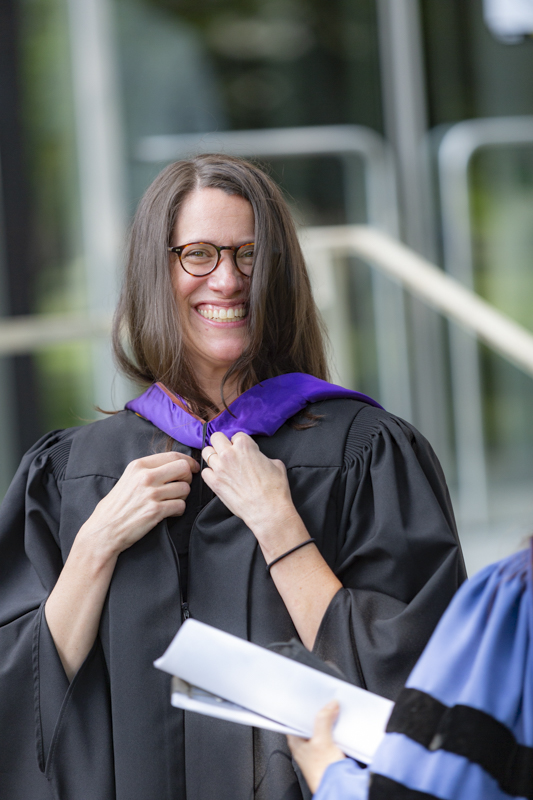
As for hope, she wondered whether we could expand hope beyond just an idea that remains within an individual's imagination and instead manifest it in real life through communal effort.
"What I find most exciting about this moment is that our emergent community can surpass the hopes for the future that any single one of us could possibly dream up on their own," she said.
Referring to media she shared in a slideshow, Scanga described her own work and works by other artists that have sparked communal creative participation, including her piece Breathe: the emergent colony, Pauline Oliveros's Sonic Meditations, Carmina Eliason's Café Con Leche, and Colleen Kinsella and Elizabeth Jaber's Future Mothers.
Co-creating and co-imagining doesn't just have to happen in art; it can also arise on a college campus, she said. "Co-imagining is my word for uninhibitedly, fearlessly generating ideas, proposals, pathways, trajectories, and possibilities," especially important at this moment of a newly emergent Bowdoin community. Read the full text of Carrie Scanga's remarks.
Opening of the College
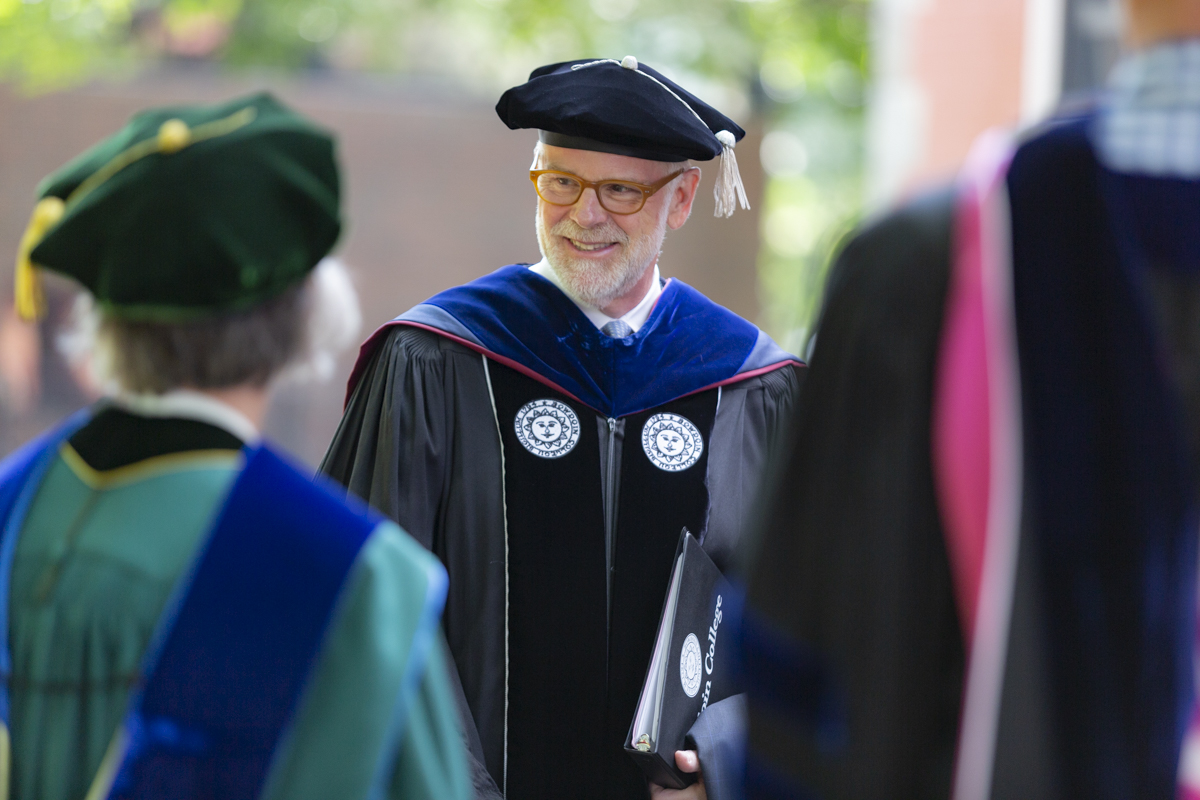
In his remarks, President Rose shared memories from his first year of college, including his shock at receiving a C+ on a chemistry test his first semester and getting essays returned from professors covered in red comments.
While "the corrections and criticisms were tough to swallow," Rose said they also helped him to learn. And the reason he was sharing "old-guy stories from the distant past" with eighteen- and nineteen-year-olds was to ask them to consider the expectations they may have for themselves and college.
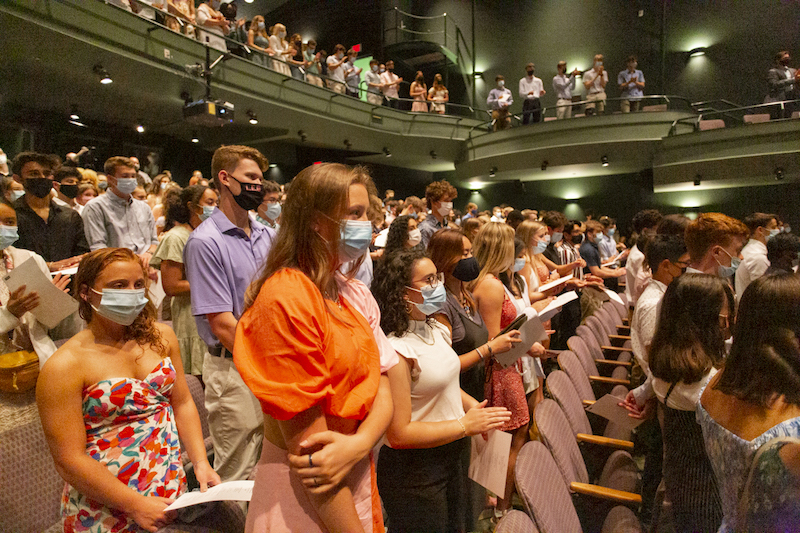
"When I hear college described as 'the best four years of your life,' I worry a bit about how that message is received and internalized by all of you. I know you are excited to be here Bowdoin and to be starting college. And Bowdoin will be great for you, I have zero doubt about that. But it needs to come with a dose of reality about your expectations of what will happen, and your expectations for yourself," he said.
What students can expect is that they will develop the ability to think critically, to reason well, to communicate clearly, to learn over a lifetime, to be intellectually nimble, and to collaborate, he said. As well as helping to prepare students for success and satisfaction in their chosen careers, a liberal arts education will help them "to live a life of meaning by better understanding the natural, social, political, and cultural worlds, and the issues, challenges, and opportunities we face." And, a Bowdoin education will set them up "to participate thoughtfully in civic life," Rose said.
But, he stressed, this "all of this takes hard work, perseverance, and help from others, and the path is never, ever straight." Read the full text of Rose's remarks.
Music
The Academic Processional, "Trumpet Tune" by Henry Purcell, was performed by Joyce Moulton on piano. She also played the Academic Recessional, "Raise Songs to Bowdoin" and "The Rejoicing" by George Frederic Handel. Julia Duvall ’23 and Paris Wilson ’23 performed "America the Beautiful" on violin following the Invocation.

